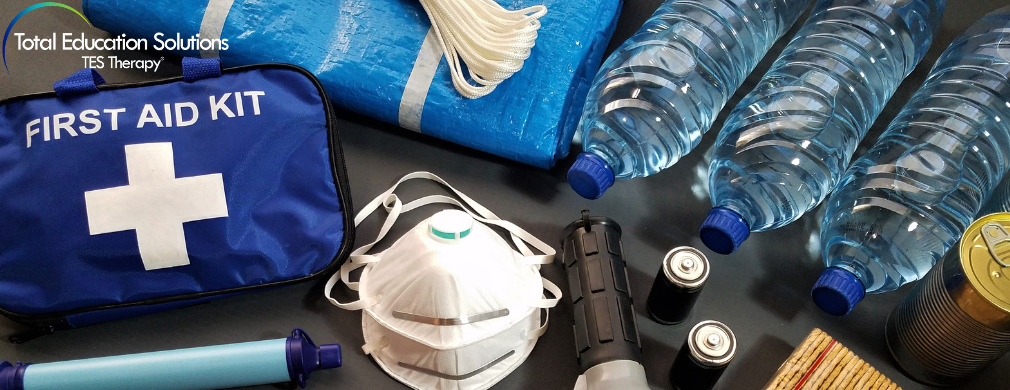Celebrating NICU Awareness Month
September is NICU Awareness Month. It’s a time to honor families and health professionals who are part of the neonatal intensive care unit (NICU), where premature babies (born before 37 weeks of pregnancy) or sick newborns are cared for. Many of the babies we see for services had a NICU stay. It’s a place I never thought I’d encounter, but now it is a special place for my family because we spent over three months there with our daughter, Romy.
As a new mom, my journey into motherhood took an unexpected turn when Romy was born prematurely at just 25 weeks and five days. Yes, the five days matter; every day I stayed pregnant was another day she grew stronger, and the scary statistics moved more in her favor. Her early arrival meant a long stay in the NICU, where she spent 109 days growing stronger. During that time, we learned about the incredible team of professionals it takes to help these babies. Our daughter was followed by a neonatologist and cared for 24/7 by specialized nurses. Romy was also seen by many professionals, including respiratory therapists, x-ray technicians, ophthalmologists, a pediatric cardiologist, a nephrologist, and an occupational therapist, to name a few. We were also assigned a social worker to support us through Romy’s NICU stay, which was incredibly helpful. Everyone played an essential role in Romy’s success and helped her reach the ultimate goal of going home. We were lucky; Romy had no significant health issues. Her main job was to eat, sleep, and grow so she could come home. Toward the end of her stay, we were becoming more eager to have Romy home with us. Daily visits to the hospital while working were becoming exhausting. After three months, the doctors said she was ready to go home. We were beyond excited! But once we got there, we realized we were alone without the nurses, doctors, and monitors. We were overwhelmed but also so thankful we had family support to help. We soon learned we could access another support system through early intervention services. I knew about early intervention services. At the time, I had worked at Total Education Solutions for 11 years, and it gave me tremendous insight. Over the years, I saw hundreds of kids who came for weekly services. I was able to see them make progress from month to month thanks to their therapists’ dedication and parents’ commitment.
However, experiencing it firsthand opened my eyes to the profound impact these services can have on the development of premature babies. I was now a parent and could relate to some of the parents who brought their kids to our clinics. Because of Romy’s prematurity, she was considered high-risk and referred for early intervention services upon discharge. This was the next phase in supporting her development. We started with infant stimulation services and occupational therapy (OT), which became invaluable resources on our road to progress. Occupational therapy was a game-changer, especially when it came to feeding. Bottle feeding was an uphill battle, which delayed Romy’s discharge from the hospital. Our occupational therapist was a saving grace. With her guidance, we learned techniques to make feeding less stressful for our baby and us. As we approached the introduction of solid foods, our OT’s support continued. Transitioning to solid food was intimidating, especially moving past purees, but having the guidance of an occupational therapist was comforting. We worked with Romy’s OT for about 18 months. Through consistent effort, focusing on feeding, fine motor, and gross motor skills, Romy achieved her goals and was discharged from occupational therapy. This was bittersweet. We were so happy Romy had met her goals and didn’t need the services, but we would miss our therapist and the expertise she provided. When Romy was 18 months (15 months adjusted), we noticed she was behind in her language development. Despite using sign language to communicate her needs, she wasn’t saying more than a few words. Her occupational therapist and pediatrician recommended a speech evaluation, which led us to another phase of early intervention. A Speech-Language Pathologist (SLP) evaluated Romy via Zoom because of COVID. The Speech-Language Pathologist told us she was delayed in her expressive language skills and qualified for speech services. Romy would receive speech services at TES’ clinic and her daycare once a week.
At first, progress felt slow, but after a few months, her expressive language was blossoming. We also believe having her at daycare with other kids her age helped, too. She started talking more and more, ultimately catching up to her peers. As we neared her third birthday, it was time for her to be re-evaluated to transition her out of regional center services and to the school district. The therapist was so impressed with her vocabulary and her ability to communicate. It was apparent that speech therapy was beneficial, and she was no longer eligible for speech. This was another bittersweet moment for us. Romy is now four years old and thriving in Transitional Kindergarten. She doesn’t stop talking, but we wouldn’t have it any other way. Through this experience, we learned early intervention services were crucial in Romy’s development. Having these knowledgeable professionals available to support us and Romy through her development was invaluable, thanks to the Head Start program.
What Are Early Intervention Services
According to the U.S. Office of Head Start Services, “Head Start programs support children’s growth from birth to age 5 through services centered around early learning and development, health, and family well-being”. However, early intervention services focus on services from birth to three years old. These services can be life-changing, supporting children in reaching their developmental milestones. They are also an invaluable resource for parents, giving them expert advice and guidance during an overwhelming time.
How to Access Services
Accessing early intervention services varies by state. Googling “Early intervention services in [insert state]” will help you get started. TES has offices in California, Michigan, and Ohio and provides early intervention services.
California
In California, the Early Start program offers a comprehensive array of services tailored to each child’s needs. These services can include speech therapy, physical therapy, occupational therapy, and more. The program emphasizes family involvement and offers support through Individualized Family Service Plans (IFSPs), ensuring the family’s unique priorities and goals are addressed. Services are provided through regional centers. The Early Start website has information about the program and how to initiate services.
Michigan
Michigan’s Early On program focuses on identifying developmental delays early and providing necessary interventions. Families work closely with service coordinators who help create Individualized Family Service Plans. Services can include developmental therapies, assistive technology, and family training to ensure consistent progress monitoring and support. Anyone can make a referral to request an evaluation here.
Ohio
Ohio’s Help Me Grow program aims to provide early intervention services that enhance child development and empower families. The program offers developmental evaluations and collaborates with families to design Family-Centered Plans (FCPs). Services encompass speech and language therapy, physical therapy, and more, aiming to maximize children’s developmental potential. Submit a referral to Help Me Grow here. Our journey as a new mom to a premature baby has been full of challenges and triumphs. Early intervention services have been our guiding light, helping us navigate the delicate path of our daughter’s development. From infant stimulation services to occupational therapy, these interventions have not only supported our baby’s growth but have also empowered us as parents. As we move forward, it’s crucial to spread awareness about the availability of early intervention services nationwide. Every child deserves the chance to thrive, and these services pave the way for a brighter future, no matter the challenges that come our way.


 03 Sep 2024
03 Sep 2024 












